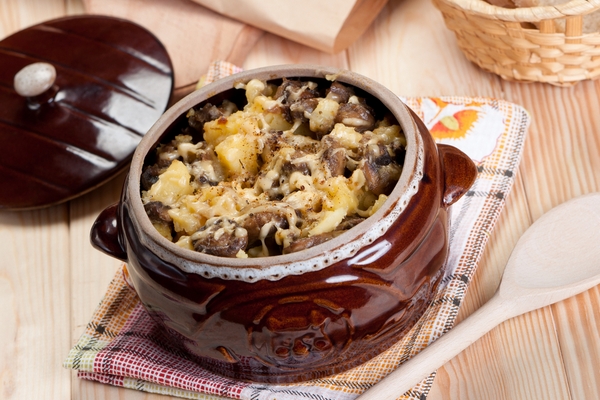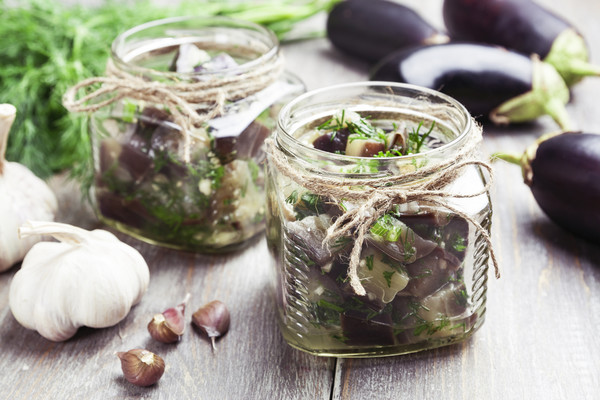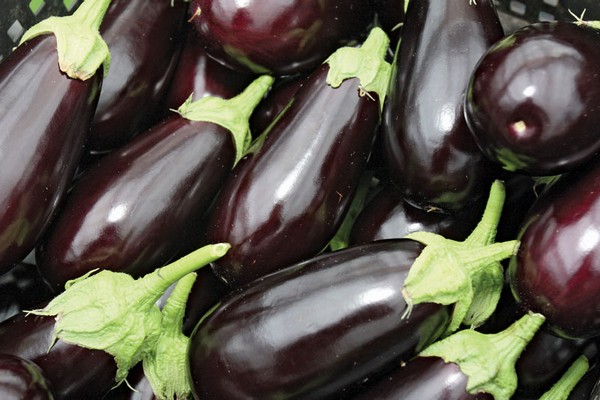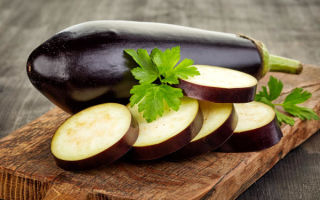Content
- 1 What is this vegetable
- 2 The chemical composition and calorie content of eggplant
- 3 The benefits of eggplant for the body
- 4 The benefits and harms of eggplant during pregnancy
- 5 Can eggplant be breastfed?
- 6 Eggplant for children
- 7 The use of eggplant in traditional medicine
- 8 Features of the use of eggplant for various diseases
- 9 The use of eggplant in cosmetology
- 10 How to cook delicious eggplant
- 11 How to remove bitterness from eggplant
- 12 The daily intake of eggplant
- 13 How to choose eggplant
- 14 How to store eggplants at home
- 15 Eggplant harm and contraindications
- 16 Conclusion
Eggplant is a special product that is used not only for culinary but also for medicinal purposes. Hypertension, gastrointestinal tract pathologies, gout, heart and vascular diseases - the vegetable contributes to the successful treatment of these and many other diseases. What are the benefits and harms of eggplant, how to use them correctly and cook deliciously - we will consider these issues in more detail.
What is this vegetable
Eggplant is a plant in the Solanaceae family. The pear-shaped or cylindrical fruit is actually a berry, although in the culinary sense it is customary to think of it as a vegetable. Fruits change color depending on the degree of ripeness - from light purple to deep purple. There is a special plant variety, the young fruits of which are milky white in color, and the more mature ones are golden.

The chemical composition and calorie content of eggplant
Eggplant contains many macro- and microelements, including:
- potassium;
- phosphorus;
- magnesium;
- manganese;
- iron;
- zinc, etc.
Also, this unusual berry contains anthocyanins - these are substances that have a preventive and protective effect. It also contains fiber, useful for digestion.
The calorie content of eggplant is low - only 24 kcal per 100 g of product. The vegetable contains 1.2 g of protein, 0.1 g of fat and 4.5 g of carbohydrates.
What vitamins are contained in eggplant
The vegetable is also distinguished by a variety of vitamin composition. It includes vitamins of group B, vitamins PP, C, beta-carotene. Such a rich content of vitamins, macro- and microelements explains the beneficial properties of eggplant.
The benefits of eggplant for the body
This tasty and healthy vegetable helps in the prevention and treatment of many diseases. It is recommended to use it in the following cases:
- For diseases associated with the work of the heart and blood vessels. Due to its high potassium content, the vegetable helps to strengthen the walls of blood vessels and heart muscle.
- For the prevention of colds - vitamin C in the composition will help not to get sick.
- To stabilize the nervous system.
- During rehabilitation after a heart attack and stroke, zinc and manganese will help to recover.
- For insomnia and stress.
- To increase the level of hemoglobin - in this case, iron helps to cope with the problem.
- For quick healing of wounds - the vegetable has a regenerating property.
Basically, younger fruits have beneficial properties. Overripe vegetables are high in solanine. In large doses, this toxin causes serious harm to the body.

For men
Statistics show that the male half of the population is most at risk of cardiovascular disease.Therefore, men in particular are advised to consume eggplants for the prevention of atherosclerosis, coronary heart disease and other pathologies.
For women
Due to the high content of manganese, the vegetable is especially useful for women during premenstrual syndrome and menopause. Its use will help alleviate mood instability, relieve irritability.
Slimming
Low energy value makes the product one of the essential ingredients for dietary meals. Its folate helps flush out water, and its fiber maintains a feeling of fullness, which together also helps to reduce weight.

The benefits and harms of eggplant during pregnancy
Eating eggplants during pregnancy is both healthy and possible. The product does not overload the body, but makes up for the lack of vitamins and macronutrients necessary for bearing. Also, the vegetable is useful for getting rid of edema, which often worries women during pregnancy.
Boiled or steamed vegetables will be useful, but fried and canned foods should be discarded.
Can eggplant be breastfed?
In the absence of contraindications for a nursing mother, eggplants will only benefit. They will help you diversify your diet and recover from childbirth. However, it is recommended to consume the vegetable no earlier than 4 months after the birth of the child. If eggplants were included in the mom's menu during pregnancy, then you can start eating them even when the baby reaches 2 months of age.
For the first time, it is recommended to eat a small piece in the morning to check the baby's reaction. If the baby's well-being has not worsened within 2 days, then the portion can be increased.
Eggplant for children
A growing body needs nutrients that are good for the development of the brain, nervous system, and protection from colds. But at what age can eggplants be given to a child? Doctors do not recommend including the vegetable in the diet of children under 3 years old. The digestive system of a child of this age is not yet ready to digest this product. It will be useful for older children, provided it is properly prepared - boiled, steamed or stewed vegetables have a beneficial effect on the child's body.

The use of eggplant in traditional medicine
The healing properties of eggplant are widely used in folk medicine. Internal and external use of vegetable products will be a good alternative to pharmaceutical medicines.
Using the peel
With hypertension, dried fruit peel will be useful. It should be ground in a coffee grinder and taken 1 tsp. a day before meals. It also prevents gum disease and strengthens teeth. For rinsing 1 tsp. powder, pour boiling water over and add 1 tsp. salt.
Infusion
The vegetable infusion removes bile from the body. To prepare the product, the eggplant should be cut into cubes, pour 200 ml of boiling water and place in a water bath for 30 minutes. Further, the infusion should be filtered and taken in half a glass every day before meals.

Eggplant juice
Eggplant juice has antibacterial properties. To cook it, you need to peel the vegetable, grate it and squeeze it. It is recommended to drink half a glass three times a day. This juice will also help for quick healing of cuts and abrasions.
Features of the use of eggplant for various diseases
A vegetable is useful in almost any form, but in some cases it is important to follow special cooking rules. This should be especially borne in mind in the presence of a number of diseases.
With diabetes
The menu of patients with diabetes should include boiled or steamed fruits.The peel of a vegetable is especially useful in diabetes - it is recommended to rub it and take it before meals for a month.

With pancreatitis
During acute inflammation, the use of eggplant is strictly prohibited. During the period of stable remission, it is allowed to gradually introduce the vegetable into the diet, preferably as part of vegetable soups. A few months after the attack and if you feel well, you can use the product baked or stewed.
With gastritis
With gastritis, eggplant must be subjected to heat treatment - undercooked vegetables can injure the gastric mucosa. It is recommended to comply with the established consumption rate - no more than 200 g per day.
With cholecystitis
With this disease, as with pancreatitis, these vegetables can be eaten only during the period of remission. Fried foods, as well as the use of hot spices, mayonnaise and ketchup should be discarded.
With gout
With the excretion of uric acid with gout, juice and infusion from a vegetable do well. You can eat dishes with more pleasant taste - the benefits of eggplant caviar, vegetable stews and soups are noted.

The use of eggplant in cosmetology
Eating eggplant promotes the production of collagen, thanks to which the skin becomes firm and healthy. The pulp of the raw fruit is used to heal and rejuvenate the skin:
- To get rid of wrinkles, the pulp can be mixed with aloe juice.
- Vegetable pulp mixed with kefir will help to cope with fat content.
- A mask of grated eggplant, egg yolk and sour cream is a good remedy for dryness.
The masks are applied to the face for 15-20 minutes and washed off with warm water.
How to cook delicious eggplant
What can you cook from eggplant to appreciate its taste? The vegetable can be used as a stand-alone dish and as an ingredient in other dishes:
- Eggplant goes well with other vegetables - peppers, potatoes, zucchini. Therefore, vegetable stew will be a tasty and healthy dish.
- You can also make rolls with fillings for every taste - stuffed eggplants with cheese, tomatoes, nuts.
- Eggplant can be used in sauces and vegetable dressings.
- For a vegetarian menu, cutlets and casseroles with a healthy vegetable are perfect.
Baked eggplant is healthier than fried eggplant. When frying, it absorbs a lot of oil.
The question of whether you need to skin the eggplant depends on the dish itself. Fried eggplant with a golden crust will retain its structure without the skin, but baked or stewed vegetables hold their shape better with the skin.

How to remove bitterness from eggplant
To prevent the vegetable from being bitter, it must be chopped and soaked in salted water. After half an hour, the slices should be rinsed and you can start cooking - now the taste of the dish will not be spoiled by bitterness.
The daily intake of eggplant
Young fruits can be consumed in any quantity - they are unlikely to harm the body. In case of gastrointestinal diseases, the norm should already be discussed with a specialist - usually it is no more than 200 g per day, even during the period of remission.
How to choose eggplant
When choosing, you should focus on young fruits. They are small, their length is 10-15 cm.
The peel of the tasty fruit is dark, shiny, the fruit itself is narrow and oblong, there are few seeds in it. The vegetable should be firm to the touch, and its peel should be smooth, without damage. Also, fresh and healthy fruits do not have an unpleasant odor. An overripe fruit has a stale, dry stalk and many seeds inside. Such fruits can harm the body.

How to store eggplants at home
The fruits must be stored in the refrigerator, as at room temperature they can be stored for no more than 2 days.But even in the refrigerator at a temperature of 1-2 ° C, vegetables must be protected from light with a thick cloth. In such conditions, their shelf life reaches one month.
Vegetables can also be frozen for the winter. To do this, they are cut into rings or cubes, blanched and immersed in cold water. Next, dry the eggplant, put it in a plastic bag and put it in the freezer.
Eggplant harm and contraindications
The most important thing to remember about the dangers of the product is the presence of solanine in overripe fruits. That is why you only need to choose young vegetables. You can recognize solanine poisoning by the following symptoms:
- diarrhea;
- vomiting;
- colic;
- dyspnea;
- convulsions.
However, even young fruits can be harmful in the following cases:
- Excessive consumption of low-carb eggplants in diabetes mellitus threatens the development of hypoglycemia.
- Eggplants, especially raw and fried, are most harmful for exacerbations of gastrointestinal diseases.
- Fried vegetables absorb carcinogens released from the oil during cooking, so this dish will do more harm than good.
Thus, the possible harm mainly depends on the degree of maturity of the fruit, the method of preparation and the presence of diseases in which the use of the vegetable is contraindicated.
Conclusion
The benefits and harms of eggplant depend on individual characteristics: age, health status and taste preferences. However, in most cases, this vegetable will only benefit the body due to its special chemical composition. However, it is important to keep in mind the recommendations for choosing fresh and high-quality fruit, as well as cooking methods that make the vegetable even healthier.

